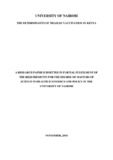| dc.description.abstract | This paper investigated the determinants of measles vaccination in Kenya using a nationally
representative Kenya Demographic and Health Survey (KDHS) 2008/09 cross-sectional data.
The influence of maternal education, maternal age, marital status, household wealth index,
antenatal care, too far distance to health facility, birth order of child and sex of child on
measles vaccination were investigated using binomial logistic regression techniques. The
study revealed that about 60% of children in Kenya were vaccinated against measles and
factors found to be having significant influence on childhood vaccination against measles
included antenatal care, birth order of child, too far distance to health facility, maternal age
and poorest household wealth index. In conclusion, increasing the number of doctors and
nurses/midwifes, reducing distance to health facilities, increasing household income of the
poorest, increasing age of mothers at first birth and single parity are significant determinants
of measles vaccination in Kenya. The above mentioned variables increase access and
utilization of quality healthcare, ultimately increasing coverage of measles vaccination. | en_US |
| dc.description.department | a
Department of Psychiatry, University of Nairobi, ; bDepartment of Mental Health, School of Medicine,
Moi University, Eldoret, Kenya | |

